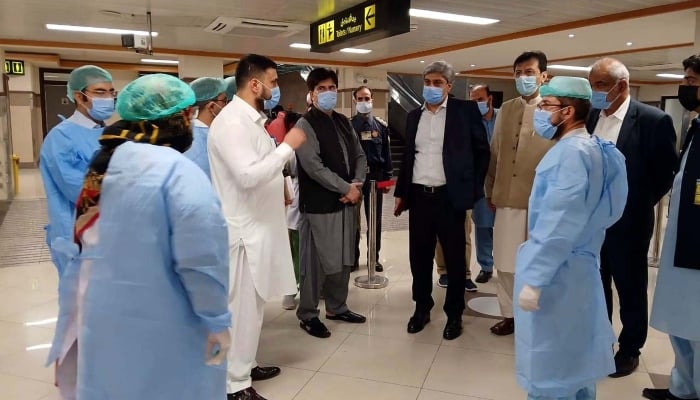
- Sources say 4,595 passengers screened at Karachi airport.
- 4,964 passengers screened at Lahore airport, say sources.
- About 4,790 passengers “screened” at Islamabad Airport.
KARACHI: At least 18,479 passengers coming from abroad were screened on Thursday as monkeypox scare grips Pakistan, airport sources told Geo News.
According to the insiders, the screening of 135 international flights passengers was done in 24 hours across the country.
The sources said 4,595 passengers were screened at the Jinnah International Airport Karachi, 4,964 passengers were screened at the Allama Iqbal International Airport Lahore and 4,790 passengers were screened at the Islamabad International Airport.
They said screening of 1,871 passengers from 14 flights was conducted at the Multan airport, 802 passengers who arrived on seven international flights were screened at the Sialkot airport, 991 at the Peshawar airport, 320 at Faisalabad airport and 146 at Quetta airport.
As per the sources, those who arrived from abroad included 32 deportees as well and none of them was tested positive for monkeypox.
The Federal Ministry of Health on August 20 issued strict guidelines provisioning screening, isolation and other preventive measures at all international airports across the country in light of the threat posed by the recent global outbreak of the monkeypox virus.
“To mitigate the risk of international spread, it is essential for all international airports in Pakistan to implement strict preventive measures,” read the notification.
Apart from provisioning screenings for passengers and crew members upon arrival, the government has also linked the issuance of visa on arrival to health clearance of the passengers.
The development comes as the country has reported at least one mpox case after a new variant was confirmed on August 15 in Sweden and was linked to a growing outbreak in Africa — the first sign of its spread outside the continent.
As per the WHO, mpox is a viral disease related to the now-eradicated smallpox virus and can spread through any close contact and through contaminated materials like sheets, clothing and needles.
Initial symptoms of the disease include fever, chills, muscle pain, swelling of the glands, exhaustion, headache and muscle weakness which are often followed by a painful or itchy rash with raised lesions that scab over and resolve over a period of weeks.
The Pakistan Civil Aviation Authority (PCAA) also directed all airlines flying into Pakistan from abroad to adopt preventive measures such as providing face masks to passengers, ensuring sanitising of the hands of staff and passengers as well as disinfection of the luggage.
As per the health ministry’s guidelines, the PCAA would be responsible for facilitating the implementation of health measures without disrupting airport activities and will ensure compliance with the SOPs by carrying out regular inspections and audits.
Meanwhile, the Border Health Services (BHS) — working as the lead agency responsible for the overall coordination and management of mpox-related operations at international airports — manages the isolation and safe transportation of suspected mpox cases to designated medical facilities.
The BHS will also report confirmed cases to local and national health authorities and maintain surveillance data.
Screening, isolation measures
The BHS has implemented thermal scanning at all entry points to detect passengers with fever, a common symptom of mpox, and their personnel will also conduct visual inspections and symptom checks to identify any passengers displaying signs of the disease.
Passengers or crew members identified as potential mpox cases will be immediately isolated in a designated area within the airport.
The authority will also enforce quarantine measures for passengers who have been in close contact with a confirmed mpox case, in accordance with national and international health guidelines.
In the event of a confirmed mpox case, the authority will initiate contact tracing procedures for all individuals who were in proximity to the infected person during the flight or at the airport.
Passengers identified through contact tracing will be monitored for symptoms and provided with instructions on how to report any health concerns.



